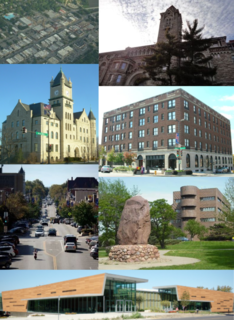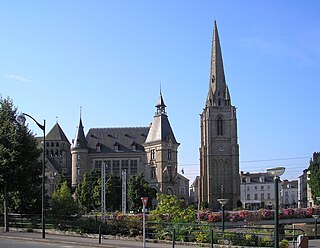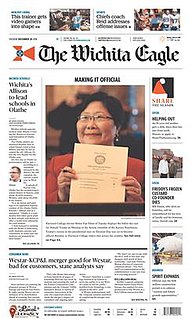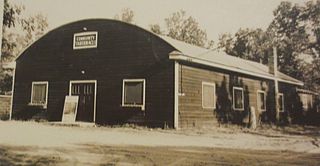
Pekin is a city in and the county seat of Tazewell County in the U.S. state of Illinois. Located on the Illinois River, Pekin is the largest city of Tazewell County and the second most populous municipality of the Peoria metropolitan area, after Peoria itself. As of the 2010 census, its population is 34,094. A small portion of the city limits extend into Peoria County. It is the most populous municipality in the United States with the name Pekin. It is a suburb of Peoria and is part of the Peoria Metropolitan Statistical Area.

Lawrence is the county seat of Douglas County, United States, and sixth-largest city in Kansas. It is in the northeastern sector of the state, astride Interstate 70, between the Kansas and Wakarusa Rivers. As of the 2020 census, the population of the city was 94,934. Lawrence is a college town and the home to both the University of Kansas and Haskell Indian Nations University.

Wichita is the largest city in the U.S. state of Kansas and the county seat of Sedgwick County. As of the 2020 census, the population of the city was 397,532. The Wichita metro area had a population of 647,610 in 2020. It is located in south-central Kansas on the Arkansas River.

The University of Kansas (KU) is a public research university with its main campus in Lawrence, Kansas, United States, and several satellite campuses, research and educational centers, medical centers, and classes across the state of Kansas. Two branch campuses are in the Kansas City metropolitan area on the Kansas side: the university's medical school and hospital in Kansas City, the Edwards Campus in Overland Park, a hospital and research center in the state's capital of Topeka, and a hospital and research center in Hays. There are also educational and research sites in Garden City, Hays, Leavenworth, Parsons, and Topeka, an agricultural education center in rural north Douglas County, and branches of the medical school in Salina and Wichita. The university is a member of the Association of American Universities and is classified among "R1: Doctoral Universities – Very high research activity".

Nicodemus National Historic Site, located in Nicodemus, Kansas, United States, preserves, protects and interprets the only remaining western town established by African Americans during the Reconstruction Period following the American Civil War. The town of Nicodemus is symbolic of the pioneer spirit of African Americans who dared to leave the only region they had been familiar with to seek personal freedom and the opportunity to develop their talents and capabilities. The site was named, at least in part, for a legendary African-American slave featured in abolitionist Henry Clay Work's "Wake, Nicodemus (1864)." It is a mystical story of an old slave died away and buried in a hollow tree who had asked to be awakened on the Day of Jubilee.

Redon is a commune in the Ille-et-Vilaine department in Brittany in northwestern France. It is a sub-prefecture of the department.

The Wichita Eagle is a daily newspaper published in Wichita, Kansas, United States. It is owned by The McClatchy Company and is the largest newspaper in Wichita and the surrounding area.

Olalla is a small unincorporated community in Kitsap County, Washington, United States. It is located on Colvos Passage on Puget Sound, just north of the Pierce County county line. Olalla used to be as large as Port Orchard, the county seat of Kitsap County. Olalla was settled in its early years by a large number of Norwegian and other Scandinavian immigrants because of its similarities to their native countries. Noted as early as the 1860s Olalla developed a commerce center by way of its good sea water access. The "old town" port located by the Olalla lagoon was made up of many business buildings, most on piers. Shipping and the mosquito fleet was very busy moving materials, goods and people.
The John S. and James L. Knight Foundation, also known as the Knight Foundation, is an American non-profit foundation that provides grants in journalism, communities, and the arts.

Stull is an unincorporated community in Douglas County, Kansas, United States. Founded in 1857, the settlement was initially known as Deer Creek until it was renamed after its only postmaster, Sylvester Stull. As of 2018, only a handful of structures remain in the area.

Idlewild is an unincorporated community in Yates Township, located just east of Baldwin in southeast Lake County, a rural part of northwestern lower Michigan. During the first half of the 20th century, it was one of the few resorts in the country where African-Americans were allowed to vacation and purchase property, before discrimination was outlawed in 1964 through the Civil Rights Act of 1964. The surrounding area is within Manistee National Forest. The community encompasses Lake Idlewild, and the headwaters of the Pere Marquette River extends throughout the region.
Moonshine is an unincorporated community located in Clark County, Illinois, United States. It has been featured on the CBS Sunday Morning Show. There is only one building in the entire town, and this was a grocery store built in 1912. It was later sold to Helen and Roy Tuttle in 1982, who created a restaurant that serves their famous Moonburger. One feature is that the store/restaurant has a guest-book with visitors from all 50 states and around the world. During the 2011 Terry Hammond Memorial Moonshine Lunchrun, held on April 9, 2011, a new record of 2068 burgers were served. The store is open from 6 AM until 1 PM Monday through Saturday, with the grill closing at 12:30.

The Kansas Lottery is a government organization run by the government of Kansas. It is a charter member of the Multi-State Lottery Association (MUSL). The mission of the lottery is to produce the maximum revenue for Kansas while insuring the integrity of its games.
Oletha A. Goudeau is a Democratic member of the Kansas Senate, representing the 29th district since 2009—the first African-American woman in the Kansas Senate. Most recently, she is the Senate Assistant Minority Leader.
McDill "Huck" Boyd was a noted small-town newspaper publisher in Phillipsburg, Kansas, United States, and twice a candidate for governor of that state.

Jacob Andrew Joseph LaTurner is an American politician serving as the U.S. representative for Kansas's 2nd congressional district. A member of the Republican Party, LaTurner was the 40th Kansas State Treasurer from 2017 to 2021 and a state senator from the 13th district from 2013 to 2017.
The State of Kansas Notable Book Awards are presented annually for fifteen notable books created by writers, illustrators or book artists who are Kansans or have written about Kansas. The award, originally established in 2006, is organized by the Kansas Center for the Book (KCFB).
The Kansas Health Foundation (KHF) is a nonprofit organization based in Wichita, Kansas, U.S., but is statewide in its focus and grantmaking abilities. Its mission is to improve public health and wellness throughout Kansas. Through grantmaking, the foundation works to "improve the health of all Kansans by promoting health and wellness in schools, neighborhoods and workplaces; to grow leaders in communities; inspire decision makers; and act as a voice for healthy public policy in Kansas for generations."

Blake Carpenter is a Republican member of the Kansas House of Representatives, representing the 81st district. He has served since 2015.
The Kenneth Spencer Research Library is a library at the University of Kansas (KU) in Lawrence. Completed and dedicated in 1968, the library houses special collections materials including rare books, maps, archives, and photographs. The library is open to members of the public and is not limited to students and faculty members at KU.












